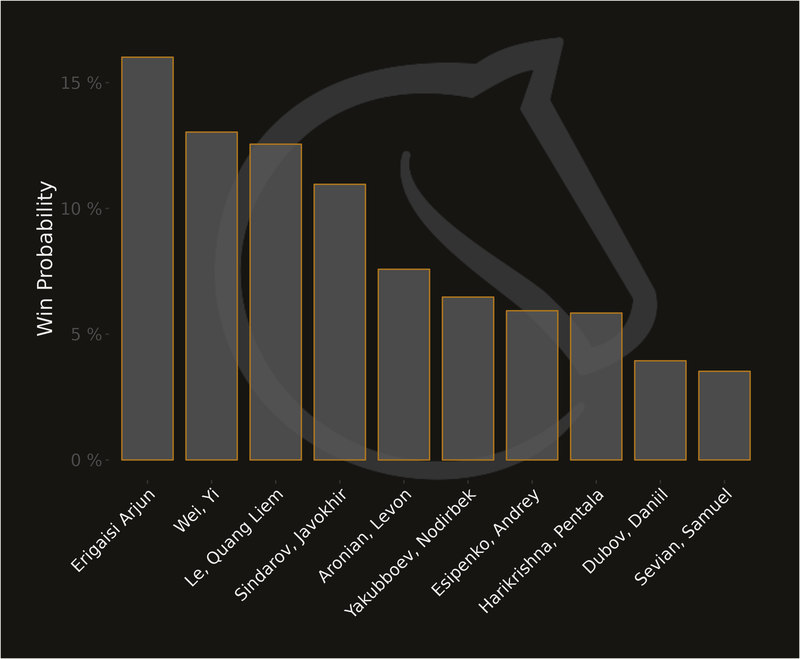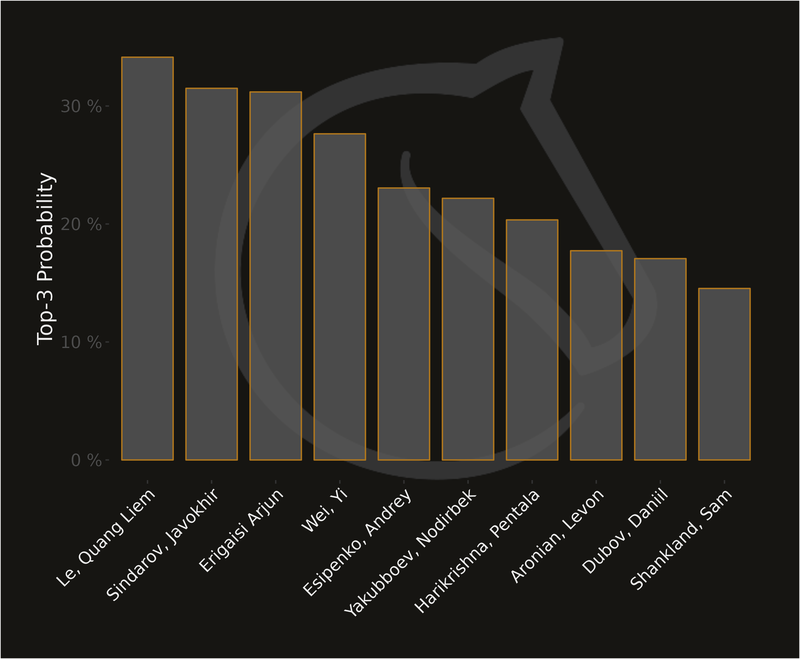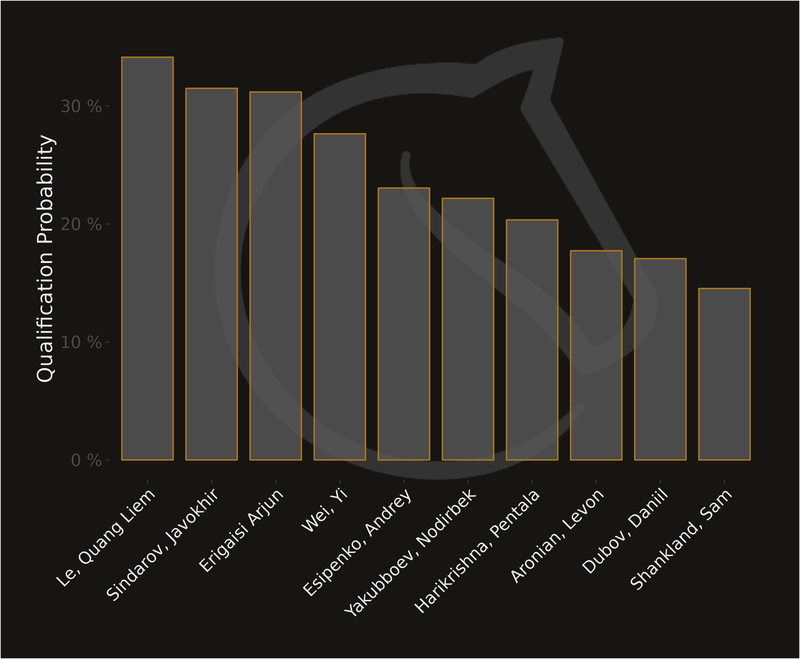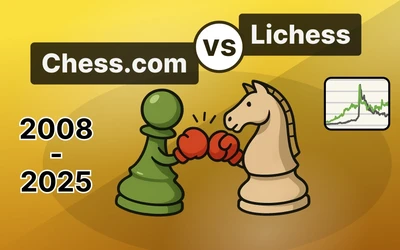
Michal Walusza / FIDE
FIDE World Cup R4: Praggnanandhaa, Keymer, Vachier-Lagrave, Blübaum Eliminated
GM Daniil Dubov eliminated GM Praggnanandhaa R, while GM Andrey Esipenko got the best of GM Vincent Keymer, GM Aleksey Grebnev emerged victorious against GM Maxime Vachier-Lagrave, and GM Alexander Donchenko won against his compatriot, GM Matthias Blübaum.Tournament Information
The FIDE World Cup is one of the most prestigious events of the chess calendar every two years. It is the largest knockout tournament and awards three Candidates spots to the first three finishers. 206 players are playing the tournament, with each round only growing in intensity. The time control is 90+30 for the first 40 moves, with an extra 30 minutes after move 40. Matches are played in sets of two: first, a classical portion of 2 games. If the result remains tied, the players play 15+10 games, then, if still tied, 10+10 games, then 5+3, then 3+2, and finally, if still tied, a deciding Armageddon game.
Watch and replay all the games in our broadcast.
Pairings for Round 5
The pairings for round 5 are available here.
Overview
GM Daniil Dubov eliminated GM Praggnanandhaa R in the rapid tiebreaks after getting close to eliminating Praggnanandhaa in classical. GM Andrey Esipenko defeated GM Vincent Keymer in the second rapid tiebreak in dominant fashion, while GM Aleksey Grebnev emerged victorious against GM Maxime Vachier-Lagrave in Vachier-Lagrave's pet Najdorf opening, securing match victory after neutralizing Vachier-Lagrave's first-move opening advantage in their second game. GM Alexander Donchenko won against his compatriot, GM Matthias Blübaum, after playing a beautiful positional game in their classical match.
Interviews
Make sure to check out all of our interviews from the World Cup on our YouTube channel! All our interviews from Round 4 are also embedded throughout this article.
Classical Upsets
GM Alexander Donchenko vs. GM Matthias Blübaum
After a very solid first game, where the engine's evaluation never shifted above +0.3, Donchenko knocked out 2026 FIDE Candidates participant Blübaum with a resounding positional win in the second classical game of their match. Blübaum's pieces seemed to be misplaced, and move by move, Donchenko created positional weaknesses in Blübaum's camp, eventually showing the power of the bishop pair in the endgame.
Watch our interview with GM Alexander Donchenko:
https://www.youtube.com/watch?v=0jplEdbUyOg
GM José Martínez Alcántara vs. GM Alexey Sarana
GM José Martínez Alcántara continues to surge in the world rankings as well as in this event, cracking GM Alexey Sarana's Marshall Gambit against the Semi-Slav Defense in exemplary fashion.
Sarana had to bounce back in game two, but he chose a bad line against Martínez's go-to drawing weapon, and indeed Martínez was winning the game by move 12, but he chose the pragmatic approach with a move repetition, ensuring his spot in round 5 of the World Cup.
Watch our interview with GM José Martínez Alcántara:
https://www.youtube.com/watch?v=cK7wuTjF7po
Tiebreak Upsets
GM Daniil Dubov vs. GM Praggnanandhaa R
GM Daniil Dubov's strategy of heading for the tiebreaks as quickly as possible was almost thwarted as he found himself in a nearly winning position multiple times in his first-round encounter against GM Praggnanandhaa R. Indeed, Praggnanandhaa's 10. h3 against Dubov's Marshall Gambit of the Ruy Lopez did not seem to be such a great choice. However, it has to be said that even though Praggnanandhaa was nearly lost for much of the game, there was no clear knockout blow, and Dubov's winning attempts, e.g., 16...Qe8 and 39...Nf5, were not so easy to find. Unfortunately for Dubov, just as in game two, a draw was the result of both players' efforts, forcing the match to move into the rapid tiebreaks.
After an uninspired 12-move draw as White, Dubov was in his element in game 2, where his unorthodox opening approach with 4...d6 and 5...Nb8 led to a fresh position. Dubov beautifully outplayed Praggnanandhaa, finishing the game off with a brilliant tactic.
 Photo: Michal Walusza / FIDE
Photo: Michal Walusza / FIDE
GM Andrey Esipenko vs. GM Vincent Keymer
GM Andrey Esipenko and GM Vincent Keymer's games in the classical and 15+10 portions of their match were not without certain moments of intrigue, but, overall, they were rather timid affairs. Apart from game 3 of the match, that is, where in the first 15+10 tiebreak game, Keymer was almost winning against Esipenko, but could not find the right continuation.
After drawing game two of the 15+10 portion without much issue, Esipenko found renewed energy, defeating Keymer with a fiery display of aggressive chess, which was marked by endgame and positional mastery.
Watch our interview with GM Andrey Esipenko:
https://www.youtube.com/watch?v=XXN6QCOx0kc
GM Aleksey Grebnev vs. GM Maxime Vachier-Lagrave
After two uneventful classical games, GM Aleksey Grebnev, the 86th seed in the tournament, showed his class once again as he defeated GM Maxime Vachier-Lagrave in one of his areas of expertise, the Sicilian Najdorf. While not a perfect game, the closing tactic by Grebnev, with 48. Kd4! and 49. Bh6!!, was a delightful sight to behold.
GM Maxime Vachier-Lagrave tried his best to bounce back in the second game, but Grebnev chose a very drawish line of the Petrov, ensuring his qualification to the next round.
 Photo: Michal Walusza / FIDE
Photo: Michal Walusza / FIDE
GM Sam Shankland vs. GM Richárd Rapport
As is customary in any match featuring GM Richárd Rapport, the positions are always unique and unexplored. Unfortunately for Rapport, it was GM Sam Shankland who was able to navigate said uncharted waters as he won two rapid games back-to-back, with the second game showing an impeccable destruction of the Modern Defense.
Watch our interview with GM Sam Shankland:
https://www.youtube.com/watch?v=u1dyy4iEunU
GM Frederik Svane vs. GM Shant Sargsyan
Both GM Frederik Svane and GM Shant Sargsyan were clearly planning to play the tiebreaks as they played very equal, dry classical games. It was Svane who drew first blood as he slowly but surely outmaneuvered Sargsyan in the Italian Game, cleverly trading off pieces and gaining space on the kingside with an h-pawn push. The h-pawn later became a g-pawn, and said g-pawn decided the game as it cramped Black's position and allowed White's king to infiltrate in the endgame.
Game two was not drawish, but it was not what Sargsyan had hoped for, either. Svane again outplayed Sargsyan, first neutralizing Sargsyan's Catalan opening, then achieving a solid position where Sargsyan felt compelled to sacrifice a piece. There was nowhere near enough compensation, however, and after Svane defended for a short while, a draw was agreed in what was a losing position for Sargsyan.
Watch our interview with GM Frederik Svane:
https://www.youtube.com/watch?v=so55nIEbfFQ
GM Gabriel Sargissian vs. GM Awonder Liang
In the first classical game, GM Awonder Liang had a deceptively winning position against GM Gabriel Sargissian: while the engine assesses it at +3.5, and more, at some point, the position is very difficult for a human to understand and play.
Following the classical bit, Sargissian won a topsy-turvy game one of rapid, and after Liang was unable to win the second rapid game, Sargissian qualified to round five of the World Cup.
 Photo: Michal Walusza / FIDE
Photo: Michal Walusza / FIDE
Near-Upset
GM Samuel Sevian vs. GM Lorenzo Lodici
GM Samuel Sevian and GM Lorenzo Lodici played a grueling match that ended in the Armageddon tiebreaks. First, Lodici had an advantage in game three but failed to convert. Both players also had an advantage in game four, but again a draw was the result. Game five saw Sevian win after he was lost, though he was lost after having a winning position.
Lodici kept the match going with a dominant win in game six, though.
Lodici again won as White in game seven, but Sevian won an exquisite, slow, maneuvering game eight.
The players again traded blows as White in the 3+2 portion of the match.
The Armageddon game broke the pattern, however, as Sevian was able to win as Black without much issue.
Watch our interview with GM Samuel Sevian:
https://www.youtube.com/watch?v=NxNSkF7F208
The Rating-Expected Results
GM Arjun Erigaisi overcame GM Peter Leko in the rapid tiebreaks after they drew rather flat classical games.
Watch our interview with GM Arjun Erigaisi:
https://www.youtube.com/watch?v=UK_pO01-Ss8
GM Levon Aronian won his match in classical, after he won a very well-played and well-prepared game against GM Radosław Wojtaszek, who could not put any pressure on Aronian in their second game.
Watch our interview with GM Levon Aronian:
https://www.youtube.com/watch?v=-vqGLr49MJ0
GM Nodirbek Yakubboev similarly won against GM V Pranav in the classical portion of their match, winning very solidly with the Scotch Opening.
 Photo: Michal Walusza / FIDE
Photo: Michal Walusza / FIDE
GM Lê Quang Liêm also won his second classical game against GM Karthik Venkataraman.
Watch our interview with GM Lê Quang Liêm:
https://www.youtube.com/watch?v=ouI8xv_d6BY
Meanwhile, GM Wei Yi defeated GM Parham Maghsoodloo in a chaotic tiebreak match that could have gone either way.
Watch our interview with GM Wei Yi:
https://www.youtube.com/watch?v=33oE8s9MBwA
GM Javokhir Sindarov clinched his match against GM Yu Yangyi by winning game two of the 15+10, and so too did GM Pentala Harikrishna in his second game against GM Nils Grandelius.
Watch our interview with GM Pentala Harikrishna:
https://www.youtube.com/watch?v=NN7YsUjUGIM
Simulated Predictions
We once again simulated the tournament outcome a million times, including the results from previous rounds.
- Who is most likely to win the tournament outright?

- Who is most likely to get in the top 3?

- Who is most likely to qualify for the Candidates? (now the same as the top 3 graph)

Aside from these stats:
- Highest chance to win: Arjun with 16.0% (up from Keymer with 10.7%)
- Chances to qualify for Candidates: Lê Quang Liêm (34.1%), Sindarov (31.5%), Arjun (31.2%)
- Chance of the 4th-placed player qualifying: 0% (down from 9.1%, as none of the qualified players are left in the tournament)
- Chance of a sub 2700 player winning: 39.9% (up from 26.3%, more favourites are out)
- Chance of a sub 2600 player winning: 0% (down from 0.3%, with Lodici being the last to go out)
- Chance of a sub 2700 player qualifying: 94.1% (up from 75.1%)
- Chance of two sub 2700 players qualifying: 54.8% (up from 30.6%)
- Chance of a sub 2600 player qualifying: 0% (down from 2.2%, as all are out)
- Chance of an Indian player winning: 21.9% (slightly down from 22.7%)
- Chance of an American player winning: 14.3% (up from 11.7%)
- Chance of a Chinese player winning: 13.0% (up from 11.5%, but note that this is just the chance of Wei Yi winning now)
- Chance of a German player winning: 5.0% (down from 15.2%)
- Chance of an alliterative* player winning: 10.6% (down from 14.8%)
- Chance of Keymer playing against his long-time coach Leko: 0.0% (down from 2.2%, as both players were eliminated)
*first and last name start with the same letter or sound (e.g. Richard Rapport and Yu Yangyi)
You may also like
 Lichess
LichessInterview: Ju Wenjun - Women's World Chess Champion 2025
Lichess interviewed GM Ju Wenjun after she won her fifth Women's World Chess Championship title. CM HGabor
CM HGaborHow titled players lie to you
This post is a word of warning for the average club player. As the chess world is becoming increasin… Lichess
LichessShould I report this?
Ever encountered a user misbehaving on Lichess? Check out if and how to report them. Lichess
LichessAccomplished Bangladeshi GM Ziaur Rahman Dies Mid-Game
Lichess extends its condolences to the family, friends, and many fans of GM Ziaur Rahman, who died a… FM MathiCasa
FM MathiCasaChess Football: A Fun and Creative Variant
Where chess pieces become "players" and the traditional chessboard turns into a soccer field ChessMonitor_Stats
ChessMonitor_Stats